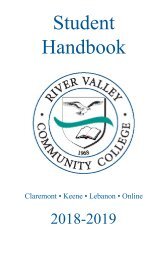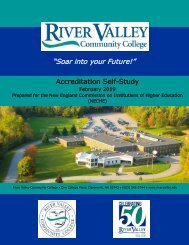Create successful ePaper yourself
Turn your PDF publications into a flip-book with our unique Google optimized e-Paper software.
Nature of Business<br />
The Community College System of New Hampshire (CCSNH or the System) is comprised of the<br />
following colleges:<br />
226 | P a g e<br />
NHTI - Concord's Community College (NHTI);<br />
Manchester Community College (MCC);<br />
Nashua Community College (NCC);<br />
Great Bay Community College (GBCC);<br />
Lakes Region Community College (LRCC);<br />
White Mountains Community College (WMCC); and<br />
River Valley Community College (<strong>RVCC</strong>).<br />
CCSNH's main purpose is to provide a well-coordinated system of public community college education.<br />
CCSNH is governed by a single board of trustees with 22 voting members appointed by the Governor<br />
and Executive Council and 2 voting members who are full time students enrolled within CCSNH and<br />
are elected by the student body. CCSNH funds its operations through tuition, room and board, fees,<br />
grants, legacies and gifts, and State of New Hampshire (State) appropriations.<br />
Community Colleges of New Hampshire Foundation (the Foundation) is a separate legal entity<br />
established as a 501(c)(3) corporation. The Foundation is structured to seek and secure private funds<br />
and/or grants in order to supplement the traditional revenue sources of CCSNH. The Foundation’s<br />
mission is to support CCSNH and make higher education more accessible by providing student<br />
scholarship assistance, facility and staff support programs, and improved education facilities. These<br />
assets and all activity of the Foundation are included in the financial statements of CCSNH as a<br />
discretely-presented component unit.<br />
1. Summary of Significant Accounting Policies Basis<br />
of Presentation<br />
The accompanying financial statements have been prepared using the economic resources focus<br />
and the accrual basis of accounting in accordance with U.S. generally accepted accounting<br />
principles, as prescribed by the Governmental Accounting Standards Board (GASB). Revenues<br />
are recorded when earned and expenses are recorded when a liability is incurred, regardless of<br />
the timing of related cash flows. Grants and similar items are recognized as revenue as soon as<br />
all eligibility requirements have been met.<br />
CCSNH has determined that it functions as a business-type activity, as defined by GASB. The<br />
effect of interfund activity has been eliminated from these financial statements.<br />
CCSNH's policy is to define operating activities in the statement of revenues, expenses, and<br />
changes in net position as those that generally result from exchange transactions, such as charges<br />
for services provided to students and for the purchase of goods and services. Certain other<br />
transactions are reported as nonoperating revenues (expenses). These nonoperating revenues<br />
(expenses) include CCSNH's operating appropriations from the State, contributions, gain (loss)<br />
from the sale of capital assets, net investment income (loss), gifts received by the Foundation<br />
restricted for long-term purposes, and interest expense.<br />
Cash and Cash Equivalents





